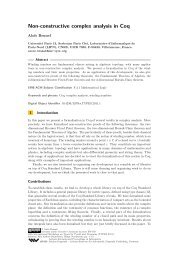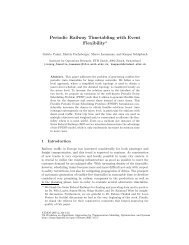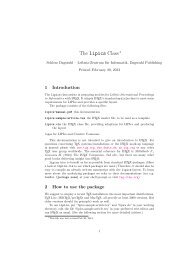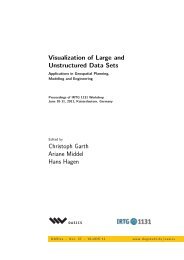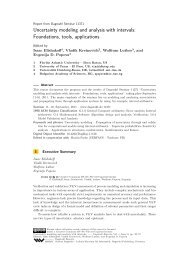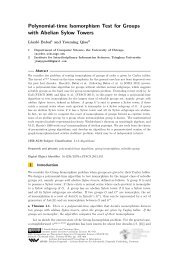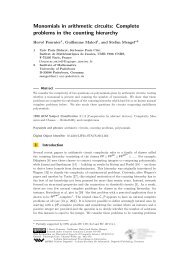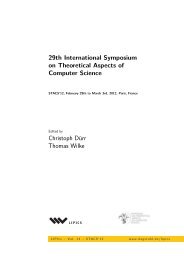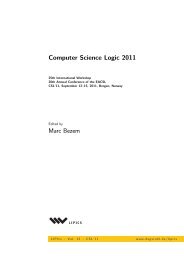Volume 1, Issue 1, January 2011 - DROPS - Schloss Dagstuhl
Volume 1, Issue 1, January 2011 - DROPS - Schloss Dagstuhl
Volume 1, Issue 1, January 2011 - DROPS - Schloss Dagstuhl
You also want an ePaper? Increase the reach of your titles
YUMPU automatically turns print PDFs into web optimized ePapers that Google loves.
118 11051 – Sparse Representations and Efficient Sensing of Data<br />
3.10 Space Splittings and Schwarz-Southwell Iterations<br />
Peter Oswald (Jacobs University – Bremen, DE)<br />
License Creative Commons BY-NC-ND 3.0 Unported license<br />
© Peter Oswald<br />
Joint work of Griebel, Michael; Oswald, Peter<br />
The talk reviews joint work in progress with M. Griebel [1], which continues our collaboration<br />
on iterative solvers for symmetric elliptic variational problems that are based on Hilbert<br />
space splittings, so-called additive and multiplicative Schwarz methods. Note that Hilbert<br />
space splittings underlying the theory of Schwarz methods have lately reappeared as fusion<br />
frames. See [2] for a review of previous work.<br />
While in the standard theory of multiplicative Schwarz methods the order of subproblem<br />
traversal is fixed, in the new versions the ordering is chosen in a weak greedy fashion,<br />
e.g., according to the size of subproblem residuals, or randomly. For linear systems and<br />
Gauss-Seidel methods (a special instance of multiplicative Schwarz methods) the greedy<br />
ordering goes back to Gauss and Seidel, and has been popularized by Southwell in the<br />
1940-50ies. The method has been theoretically analyzed in the framework of coordinate<br />
descent methods for convex optimization methods, and has lately been revived in the context<br />
of sparse approximation.<br />
Given these developments, we decided to first formulate and prove convergence results for<br />
Schwarz-Southwell methods for the case of splittings into N subproblems. The main result is<br />
an exponential energy error decay estimate of the form<br />
�u − u (m+1) � 2 E ≤ (1 − γ<br />
N )�u − u(m) � 2 E, m ≥ 0,<br />
where γ depends on the spectral bounds characterizing the space splitting, the relaxation<br />
parameter ω, and the weakness parameter β of the weak greedy step. The result shows that<br />
greedy strategies can slightly improve the performance of multiplicative Schwarz methods.<br />
We also state a similar estimate for the expected convergence rate if the subproblem ordering<br />
is randomized. Investigations on infinite splittings are still at their beginning, they benefit<br />
from the theory of greedy algorithms in infinite-dimensional Hilbert and Banach spaces<br />
developed by Temlyakov and others. We hope that a better understanding of this topic will<br />
shed new light on adaptive multilevel methods such as the early work by Rüde.<br />
References<br />
1 M. Griebel, P. Oswald, Schwarz-Southwell Methods. In preparation.<br />
2 P. Oswald, Stable space splittings and fusion frames. In Wavelets XIII (V.K. Goyal, M.<br />
Papadakis, D. Van de Ville, eds.), Proc. SPIE Vol. 7446 (SPIE, Bellingham, 2009), 744611.<br />
3.11 Sparse Approximation of Images by the Easy Path Wavelet<br />
Transform<br />
Gerlind Plonka-Hoch (Universität Göttingen, DE)<br />
License Creative Commons BY-NC-ND 3.0 Unported license<br />
© Gerlind Plonka-Hoch<br />
The Easy Path Wavelet Transform (EPWT) has recently been proposed as a tool for sparse<br />
representations of bivariate functions from discrete data, in particular from image data.



